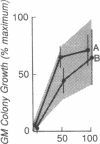Abstract
Marrow and peripheral blood cells from nine children with juvenile chronic granulocytic leukemia (JCGL) demonstrated intense (94 +/- 16% maximum) spontaneous granulocyte/macrophage colony growth but cells from five children with the adult variety of CGL did not. This unusual pattern of colony growth depended upon a stimulatory protein(s) produced by mononuclear phagocytes. No GM-CSA activity was found in any chromatofocused fraction of JCGL monocyte-conditioned media but an activity that induced GM-CSA in umbilical vein endothelial cells was detected at pI 6.9-7.2. Moreover, the CSA-inducing monokine was neutralized by an anti-IL-1 antibody in vitro and, in the one case so tested, the same antibody also inhibited "spontaneous" colony growth. Therefore granulocyte/macrophage colony growth in JCGL is characteristically abnormal and distinguishes JCGL from the adult form of the disease. This abnormality depends upon the production, by mononuclear phagocytes, of IL-1 which, in turn, stimulates the release of high levels of colony stimulating activity by other cells. The high proliferative activity of CFU-GM we found in JCGL patients, and the high levels of GM-CSA found in their serum are compatible with the view that the in vitro abnormality reflects a similar abnormality in vivo.
Full text
PDF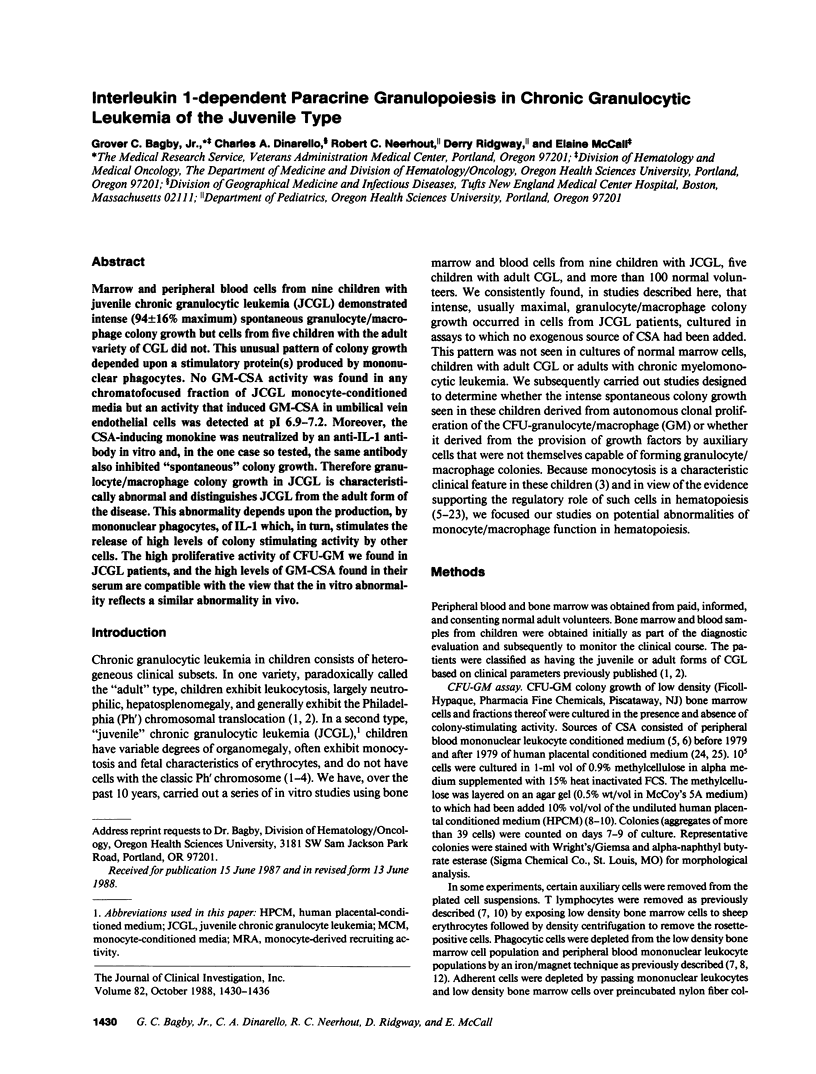
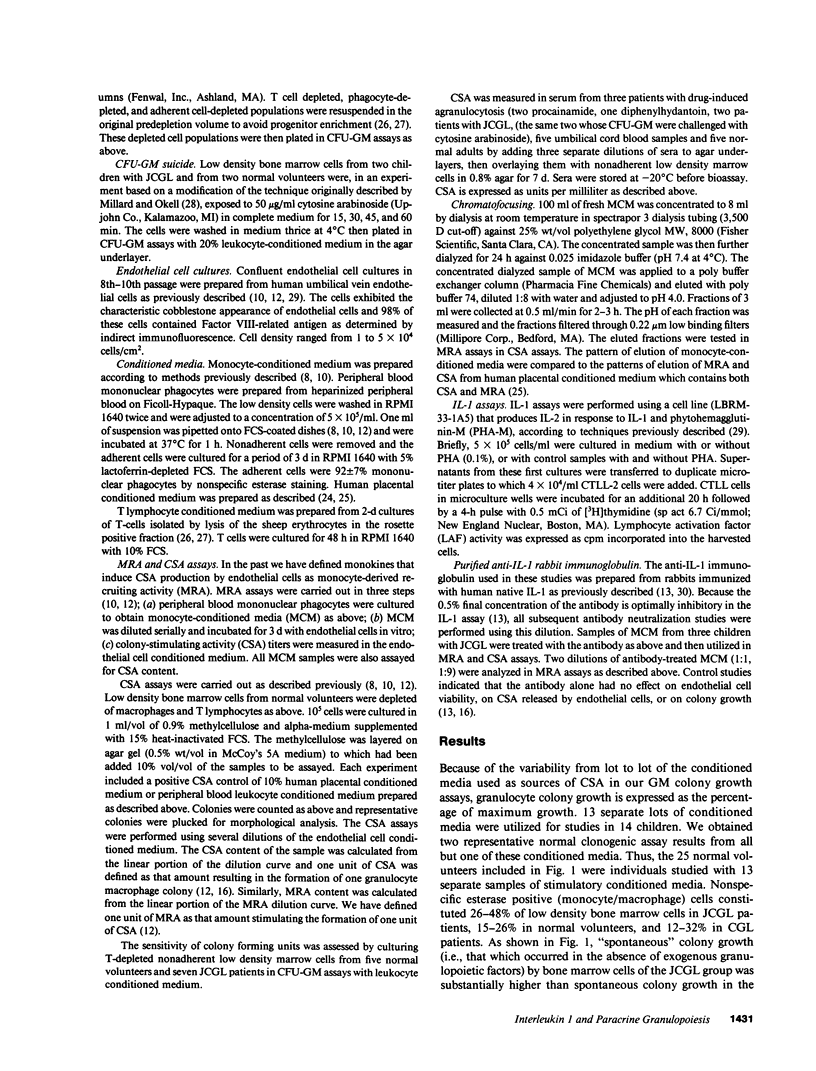
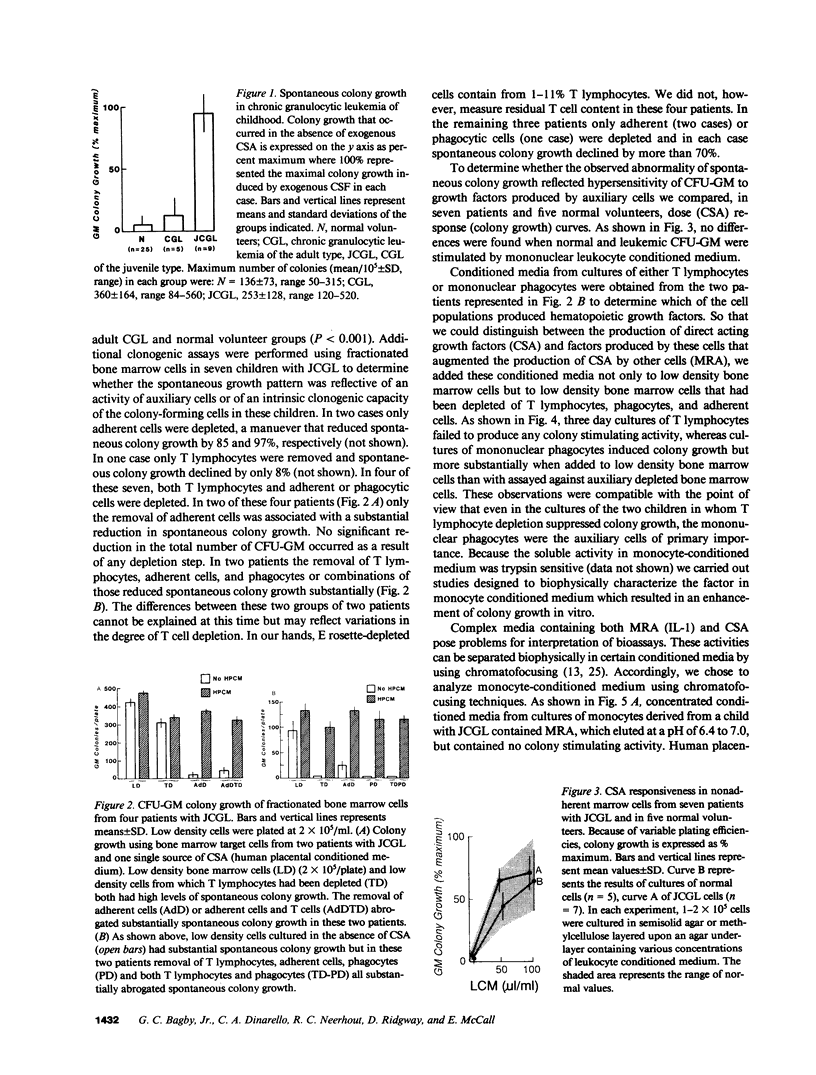
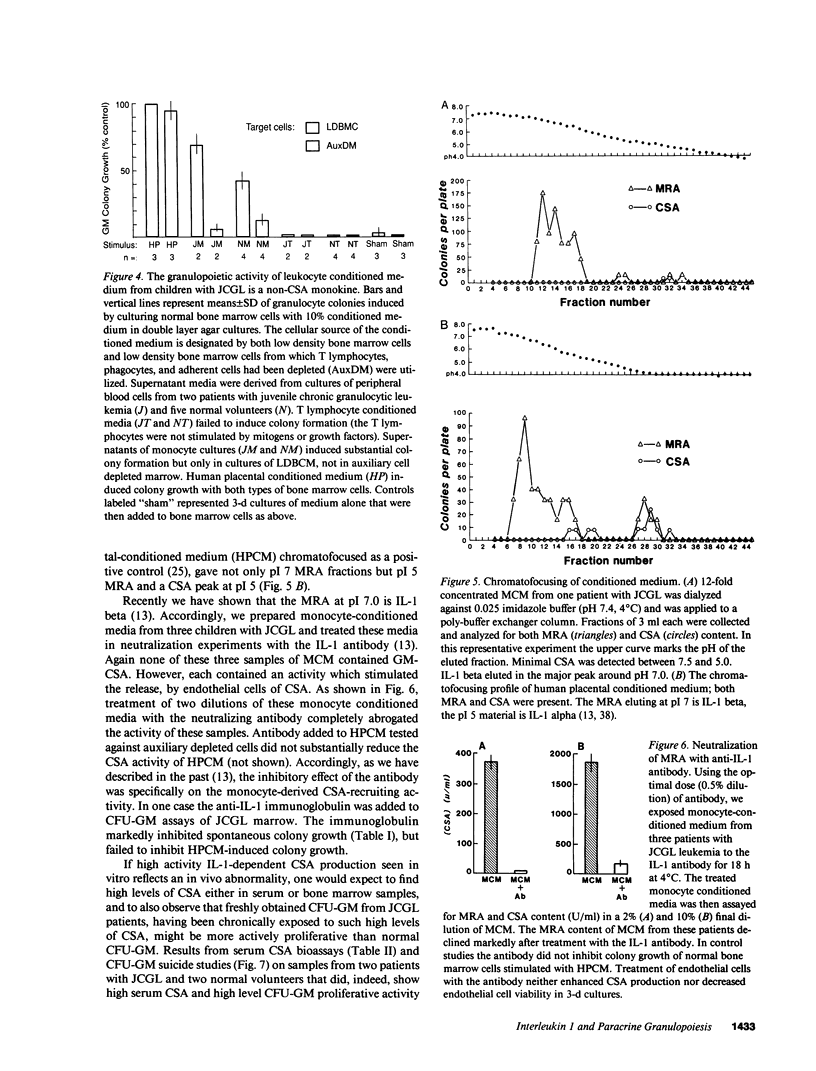
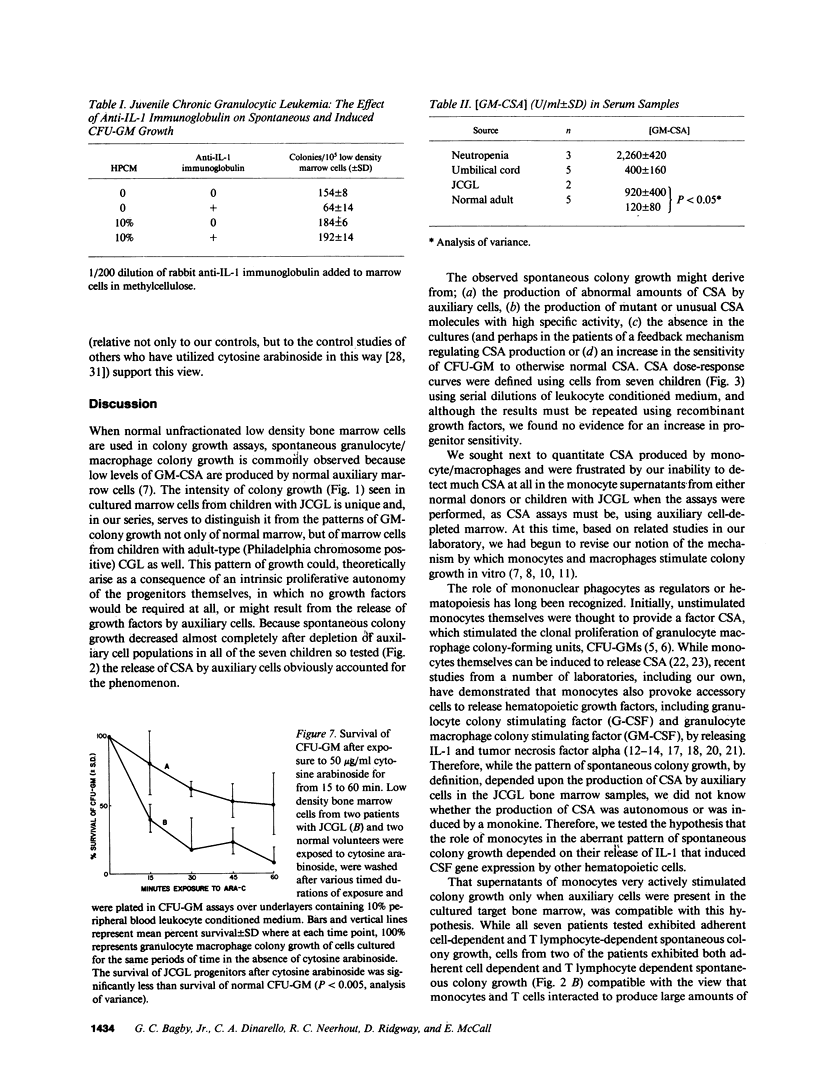
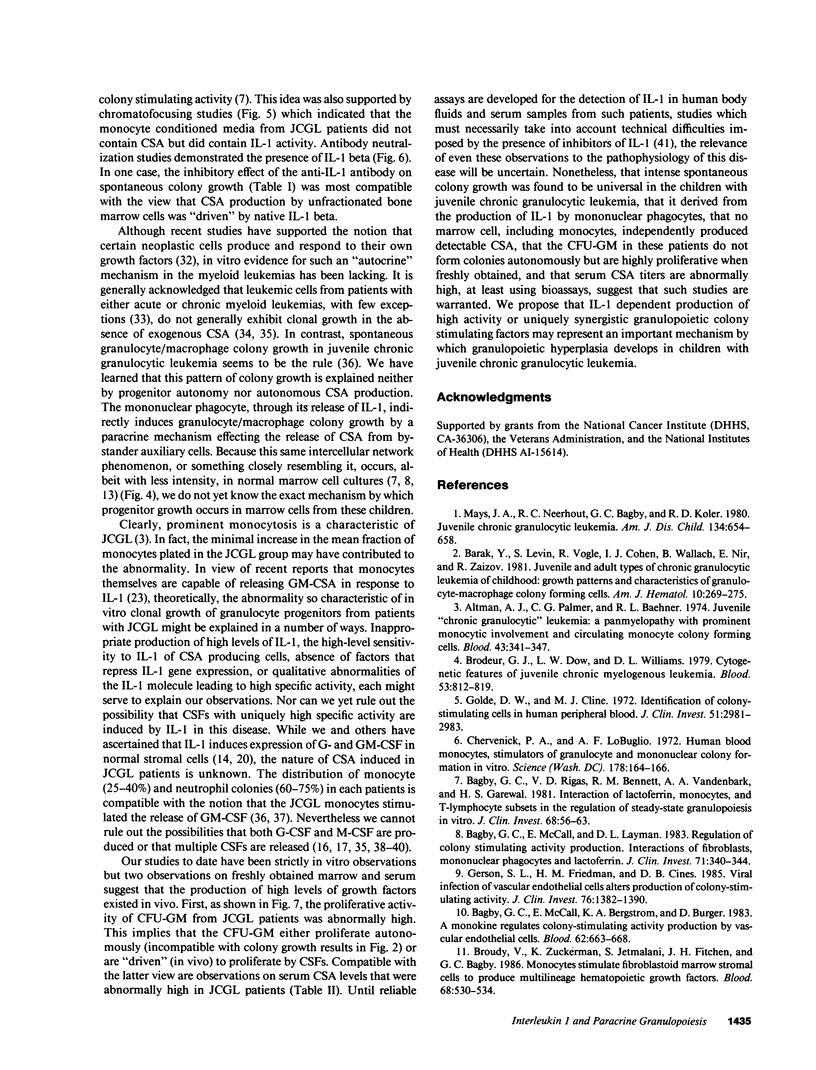
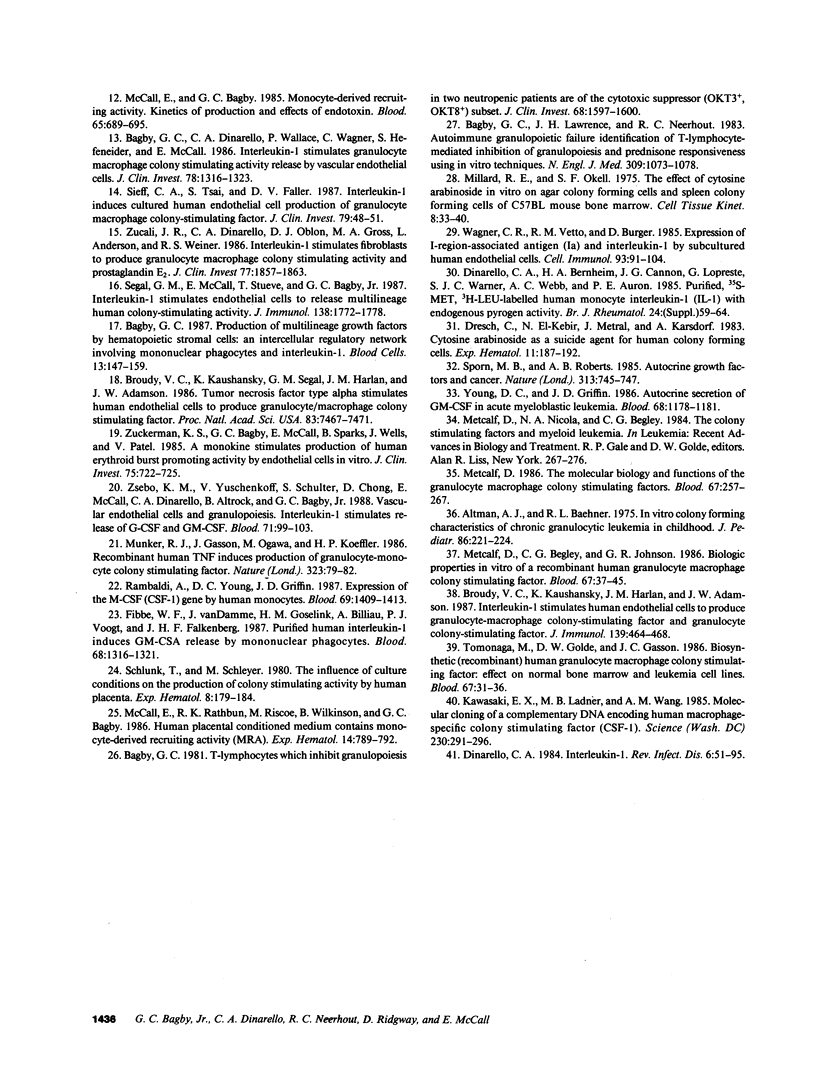
Images in this article
Selected References
These references are in PubMed. This may not be the complete list of references from this article.
- Altman A. J., Baehner R. L. In vitro colony-forming characteristics of chronic granulocytic leukemia in childhood. J Pediatr. 1975 Feb;86(2):221–224. doi: 10.1016/s0022-3476(75)80472-0. [DOI] [PubMed] [Google Scholar]
- Altman A. J., Palmer C. G., Baehner R. L. Juvenile "chronic granulocytic" leukemia: a panmyelopathy with prominent monocytic involvement and circulating monocyte colony-forming cells. Blood. 1974 Mar;43(3):341–350. [PubMed] [Google Scholar]
- Bagby G. C., Jr, Dinarello C. A., Wallace P., Wagner C., Hefeneider S., McCall E. Interleukin 1 stimulates granulocyte macrophage colony-stimulating activity release by vascular endothelial cells. J Clin Invest. 1986 Nov;78(5):1316–1323. doi: 10.1172/JCI112717. [DOI] [PMC free article] [PubMed] [Google Scholar]
- Bagby G. C., Jr, Lawrence H. J., Neerhout R. C. T-lymphocyte--mediated granulopoietic failure. In vitro identification of prednisone-responsive patients. N Engl J Med. 1983 Nov 3;309(18):1073–1078. doi: 10.1056/NEJM198311033091801. [DOI] [PubMed] [Google Scholar]
- Bagby G. C., Jr, McCall E., Bergstrom K. A., Burger D. A monokine regulates colony-stimulating activity production by vascular endothelial cells. Blood. 1983 Sep;62(3):663–668. [PubMed] [Google Scholar]
- Bagby G. C., Jr, McCall E., Layman D. L. Regulation of colony-stimulating activity production. Interactions of fibroblasts, mononuclear phagocytes, and lactoferrin. J Clin Invest. 1983 Feb;71(2):340–344. doi: 10.1172/JCI110774. [DOI] [PMC free article] [PubMed] [Google Scholar]
- Bagby G. C., Jr, Rigas V. D., Bennett R. M., Vandenbark A. A., Garewal H. S. Interaction of lactoferrin, monocytes, and T lymphocyte subsets in the regulation of steady-state granulopoiesis in vitro. J Clin Invest. 1981 Jul;68(1):56–63. doi: 10.1172/JCI110254. [DOI] [PMC free article] [PubMed] [Google Scholar]
- Bagby G. C., Jr T lymphocytes involved in inhibition of granulopoiesis in two neutropenic patients are of the cytotoxic/suppressor (T3+T8+) subset. J Clin Invest. 1981 Dec;68(6):1597–1600. doi: 10.1172/JCI110415. [DOI] [PMC free article] [PubMed] [Google Scholar]
- Bagby G. C. Production of multilineage growth factors by hematopoietic stromal cells: an intercellular regulatory network involving mononuclear phagocytes and interleukin-1. Blood Cells. 1987;13(1-2):147–159. [PubMed] [Google Scholar]
- Barak Y., Levin S., Vogel R., Cohen I. J., Wallach B., Nir E., Zaizov R. Juvenile and adult types of chronic granulocytic leukemia of childhood: growth patterns and characteristics of granulocyte-macrophage colony forming cells. Am J Hematol. 1981;10(3):269–275. doi: 10.1002/ajh.2830100306. [DOI] [PubMed] [Google Scholar]
- Brodeur G. M., Dow L. W., Williams D. L. Cytogenetic features of juvenile chronic myelogenous leukemia. Blood. 1979 May;53(5):812–819. [PubMed] [Google Scholar]
- Broudy V. C., Kaushansky K., Harlan J. M., Adamson J. W. Interleukin 1 stimulates human endothelial cells to produce granulocyte-macrophage colony-stimulating factor and granulocyte colony-stimulating factor. J Immunol. 1987 Jul 15;139(2):464–468. [PubMed] [Google Scholar]
- Broudy V. C., Kaushansky K., Segal G. M., Harlan J. M., Adamson J. W. Tumor necrosis factor type alpha stimulates human endothelial cells to produce granulocyte/macrophage colony-stimulating factor. Proc Natl Acad Sci U S A. 1986 Oct;83(19):7467–7471. doi: 10.1073/pnas.83.19.7467. [DOI] [PMC free article] [PubMed] [Google Scholar]
- Broudy V. C., Zuckerman K. S., Jetmalani S., Fitchen J. H., Bagby G. C., Jr Monocytes stimulate fibroblastoid bone marrow stromal cells to produce multilineage hematopoietic growth factors. Blood. 1986 Aug;68(2):530–534. [PubMed] [Google Scholar]
- Chervenick P. A., LoBuglio A. F. Human blood monocytes: stimulators of granulocyte and mononuclear colony formation in vitro. Science. 1972 Oct 13;178(4057):164–166. doi: 10.1126/science.178.4057.164. [DOI] [PubMed] [Google Scholar]
- Dinarello C. A. Interleukin-1. Rev Infect Dis. 1984 Jan-Feb;6(1):51–95. doi: 10.1093/clinids/6.1.51. [DOI] [PubMed] [Google Scholar]
- Dresch C., El Kebir N., Metral J., Karsdorf A. Cytosine arabinoside as a suicide agent for human colony forming cells. Exp Hematol. 1983 Mar;11(3):187–192. [PubMed] [Google Scholar]
- Fibbe W. E., van Damme J., Billiau A., Voogt P. J., Duinkerken N., Kluck P. M., Falkenburg J. H. Interleukin-1 (22-K factor) induces release of granulocyte-macrophage colony-stimulating activity from human mononuclear phagocytes. Blood. 1986 Dec;68(6):1316–1321. [PubMed] [Google Scholar]
- Gerson S. L., Friedman H. M., Cines D. B. Viral infection of vascular endothelial cells alters production of colony-stimulating activity. J Clin Invest. 1985 Oct;76(4):1382–1390. doi: 10.1172/JCI112114. [DOI] [PMC free article] [PubMed] [Google Scholar]
- Golde D. W., Cline M. J. Identification of the colony-stimulating cell in human peripheral blood. J Clin Invest. 1972 Nov;51(11):2981–2983. doi: 10.1172/JCI107124. [DOI] [PMC free article] [PubMed] [Google Scholar]
- Kawasaki E. S., Ladner M. B., Wang A. M., Van Arsdell J., Warren M. K., Coyne M. Y., Schweickart V. L., Lee M. T., Wilson K. J., Boosman A. Molecular cloning of a complementary DNA encoding human macrophage-specific colony-stimulating factor (CSF-1). Science. 1985 Oct 18;230(4723):291–296. doi: 10.1126/science.2996129. [DOI] [PubMed] [Google Scholar]
- Mays J. A., Neerhout R. C., Bagby G. C., Koler R. D. Juvenile chronic granulocytic leukemia: emphasis on cutaneous manifestations and underlying neurofibromatosis. Am J Dis Child. 1980 Jul;134(7):654–658. doi: 10.1001/archpedi.1980.02130190022006. [DOI] [PubMed] [Google Scholar]
- McCall E., Bagby G. C., Jr Monocyte-derived recruiting activity: kinetics of production and effects of endotoxin. Blood. 1985 Mar;65(3):689–695. [PubMed] [Google Scholar]
- McCall E., Rathbun R. K., Riscoe M., Wilkinson B., Bagby G. C., Jr Human placental conditioned medium contains monocyte-derived recruiting activity (MRA). Exp Hematol. 1986 Sep;14(8):789–793. [PubMed] [Google Scholar]
- Metcalf D., Begley C. G., Johnson G. R., Nicola N. A., Vadas M. A., Lopez A. F., Williamson D. J., Wong G. G., Clark S. C., Wang E. A. Biologic properties in vitro of a recombinant human granulocyte-macrophage colony-stimulating factor. Blood. 1986 Jan;67(1):37–45. [PubMed] [Google Scholar]
- Metcalf D. The molecular biology and functions of the granulocyte-macrophage colony-stimulating factors. Blood. 1986 Feb;67(2):257–267. [PubMed] [Google Scholar]
- Millard R. E., Okell S. F. The effect of cytosine arabinoside in vitro on agar colony forming cells and spleen colony forming cells of C57BL mouse bone marrow. Cell Tissue Kinet. 1975 Jan;8(1):33–40. doi: 10.1111/j.1365-2184.1975.tb01204.x. [DOI] [PubMed] [Google Scholar]
- Munker R., Gasson J., Ogawa M., Koeffler H. P. Recombinant human TNF induces production of granulocyte-monocyte colony-stimulating factor. Nature. 1986 Sep 4;323(6083):79–82. doi: 10.1038/323079a0. [DOI] [PubMed] [Google Scholar]
- Rambaldi A., Young D. C., Griffin J. D. Expression of the M-CSF (CSF-1) gene by human monocytes. Blood. 1987 May;69(5):1409–1413. [PubMed] [Google Scholar]
- Schlunk T., Schleyer M. The influence of culture conditions on the production of colony-stimulating activity by human placenta. Exp Hematol. 1980 Feb;8(2):179–184. [PubMed] [Google Scholar]
- Segal G. M., McCall E., Stueve T., Bagby G. C., Jr Interleukin 1 stimulates endothelial cells to release multilineage human colony-stimulating activity. J Immunol. 1987 Mar 15;138(6):1772–1778. [PubMed] [Google Scholar]
- Sieff C. A., Tsai S., Faller D. V. Interleukin 1 induces cultured human endothelial cell production of granulocyte-macrophage colony-stimulating factor. J Clin Invest. 1987 Jan;79(1):48–51. doi: 10.1172/JCI112806. [DOI] [PMC free article] [PubMed] [Google Scholar]
- Sporn M. B., Roberts A. B. Autocrine growth factors and cancer. 1985 Feb 28-Mar 6Nature. 313(6005):745–747. doi: 10.1038/313745a0. [DOI] [PubMed] [Google Scholar]
- Tomonaga M., Golde D. W., Gasson J. C. Biosynthetic (recombinant) human granulocyte-macrophage colony-stimulating factor: effect on normal bone marrow and leukemia cell lines. Blood. 1986 Jan;67(1):31–36. [PubMed] [Google Scholar]
- Wagner C. R., Vetto R. M., Burger D. R. Expression of I-region-associated antigen (Ia) and interleukin 1 by subcultured human endothelial cells. Cell Immunol. 1985 Jun;93(1):91–104. doi: 10.1016/0008-8749(85)90391-0. [DOI] [PubMed] [Google Scholar]
- Young D. C., Griffin J. D. Autocrine secretion of GM-CSF in acute myeloblastic leukemia. Blood. 1986 Nov;68(5):1178–1181. [PubMed] [Google Scholar]
- Zsebo K. M., Yuschenkoff V. N., Schiffer S., Chang D., McCall E., Dinarello C. A., Brown M. A., Altrock B., Bagby G. C., Jr Vascular endothelial cells and granulopoiesis: interleukin-1 stimulates release of G-CSF and GM-CSF. Blood. 1988 Jan;71(1):99–103. [PubMed] [Google Scholar]
- Zucali J. R., Dinarello C. A., Oblon D. J., Gross M. A., Anderson L., Weiner R. S. Interleukin 1 stimulates fibroblasts to produce granulocyte-macrophage colony-stimulating activity and prostaglandin E2. J Clin Invest. 1986 Jun;77(6):1857–1863. doi: 10.1172/JCI112512. [DOI] [PMC free article] [PubMed] [Google Scholar]
- Zuckerman K. S., Bagby G. C., Jr, McCall E., Sparks B., Wells J., Patel V., Goodrum D. A monokine stimulates production of human erythroid burst-promoting activity by endothelial cells in vitro. J Clin Invest. 1985 Feb;75(2):722–725. doi: 10.1172/JCI111752. [DOI] [PMC free article] [PubMed] [Google Scholar]





